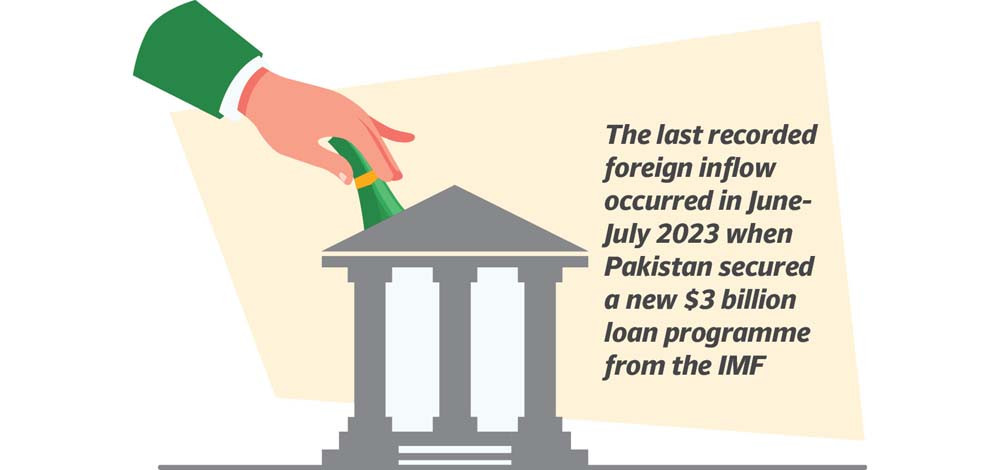Govt set to secure massive domestic borrowing of Rs11.04tr
Decision comes as banks increase lending rates to historic average of 25%

The government of Pakistan is embarking on an ambitious plan to secure new debt totalling a staggering Rs11.04 trillion over the next three months (September to November 2023) from domestic commercial banks. This extraordinary move comes as the government grapples with growing expenditures that exceed its financial means, leading to a reliance on domestic borrowing.
The decision to raise this colossal amount of new debt came after commercial banks increased their lending rates to the government to a historic average of 25% for short-term loans with durations ranging from 3 to 12 months.
This shift in the borrowing pattern reflects a policy change aimed at reducing the government’s dependence on expensive short-term loans. Instead, the government is opting to secure more debt for longer durations at a lower cost, with the goal of transforming its fast-growing, unsustainable debt into a more manageable one. This approach buys the government time to implement measures to bolster tax revenue collection, which can subsequently be used to repay the debt.
A substantial portion of the newly planned debt will be allocated to servicing the maturing local debt amounting to Rs9.23 trillion over the next three months. The remaining Rs1.81 trillion in new loans will be sought due to several factors, including a decrease in foreign currency inflows, lower tax revenue collection relative to high expenditures, exorbitant interest payments on the total debt, and financing non-development and non-markup payment expenses.
Breaking down the planned borrowing and repayment data, it is evident that the government intends to raise Rs8.70 trillion by selling Treasury bills (T-bills) to commercial banks, while having to repay Rs9.29 trillion for maturing short-term papers in the same three-month period (September to November 2023). This implies that the government will need to borrow additional funds by issuing long-term bonds with maturities of up to 10 years to cover the repayment of maturing T-bills.
Furthermore, the government plans to acquire Rs2.10 trillion by auctioning Pakistan Investment Bonds (PIBs) with durations ranging from 3 to 30 years, along with an additional Rs180 billion from long-term Shariah-compliant debt instruments.
Speaking to The Express Tribune, Economist at Arif Habib Limited, Sana Tawfik, expressed concern about the escalating interest payments on Pakistan’s total debt, which are consuming a substantial portion of the tax revenue collected. While a reduction in the central bank’s policy rate (the cost of bank lending) could potentially reduce future borrowing costs, it is unlikely to happen in the next six months. In the current fiscal year (2023-24), the government is projected to pay a colossal Rs8.5 trillion in interest payments, compared to Rs7.3 trillion in the previous year.

design: Ibrahim Yahya
Regarding the shift towards raising more debt for longer durations and less through short-term instruments, Tawfik pointed out that the government recently introduced new long-term floating debt instruments. These instruments allow banks to benefit from rising interest rates by adjusting interest payments on a fortnightly and quarterly basis, aligning them with changes in benchmark interest rates, which have been steadily increasing for over a year.
However, Tawfik also noted that the government’s reliance on domestic borrowing remains high due to a lack of foreign currency inflows. The last recorded foreign inflow, amounting to $4.2 billion, occurred in June-July 2023 when Pakistan secured a new $3 billion loan programme from the International Monetary Fund (IMF). Since mid-July, foreign inflows have ceased, leading to a continuous depletion of foreign exchange reserves for seven consecutive weeks.
The potential realisation of multi-billion dollar investments in Pakistan, such as the anticipated $25-50 billion over the next five years under the Strategic Investment Framework for China (SIFC), could provide a much-needed boost to foreign inflows and reduce the nation’s reliance on domestic debt.
Caretaker Finance Minister Shamshad Akhtar also acknowledged that export earnings and remittances from overseas workers have remained subdued in recent times.
Additionally, the government’s past policy of import control, in effect until the end of June, led to reduced tax revenue collection on imports, further necessitating domestic borrowing, said Tawfik.
In its economic outlook for August 2023, the Ministry of Finance emphasised the need for fiscal consolidation in the face of rising expenditures, particularly a significant increase of 83.2% in markup payments in FY23. The government’s strategy for FY2024 prioritises fiscal consolidation efforts, aiming to achieve a primary surplus of 0.4% and reduce the fiscal deficit to 6.5% of GDP. To achieve these goals, the government is focusing on resource mobilisation through tax measures and adopting austerity measures to control expenditures, said the ministry.
Published in The Express Tribune, September 10th, 2023.
Like Business on Facebook, follow @TribuneBiz on Twitter to stay informed and join in the conversation.


















COMMENTS
Comments are moderated and generally will be posted if they are on-topic and not abusive.
For more information, please see our Comments FAQ